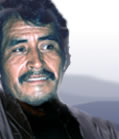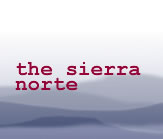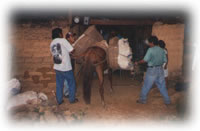 |
 |
||
 |
|||
|
RELATED THEMES development economics employment and income OTHER LOCAL THEMES BACKGROUND |
communications
The journey to sell heavy goods such as charcoal was arduous even from Ixtepeji, which is closer to Oaxaca: "They transported it on animals. At that time, transport was a little problematic, because we didn't have vehicles" (Mexico 20). The main road from Oaxaca to Tuxtepec, in a neighbouring state, passes by Ixtepeji and trucks would sometimes give lifts: ".first there were only freighters, the ones that used to carry the polvillo (mining residues) from Natividad to Oaxaca, those took us sometimes. And then the timber cutters began, there was the occasional light truck (camioneta) and [they] took us, but.we mostly walked" (Mexico 27). The cost of buying and maintaining vehicles for transporting produce is still greater than most individual families can afford. In Ixtepeji, for example, a union of flower growers share transportation to the market in Oaxaca. ".The first person who had a van here was Ismael., he already transported flowers. For that reason they named the car El floricultor (the flower grower)" (Mexico 27). At the time the interviews were gathered, only three of the four villages were linked to Oaxaca by dirt (or, in the case of Ixtlán, macadam) roads. Tiltepec, the most remote, was only reachable by mule or on foot, and that last section of the path came after some five hours' drive from Oaxaca, mostly on dirt mountain roads. Completion of the road to Tiltepec was eagerly awaited; the project advanced slowly due to limited funding. One narrator (Mexico 9) discusses the expected benefits in terms of easier transport of goods, and also other changes, for example, greater access to health services: "I think that there will be.benefits from the road. Because when the road arrives some people will begin to build houses... there will be more cars coming and the health team can come more often. with time it could help us in other ways, [we] could take [our] goods out. It could benefit us a lot. the most important thing is that it gets here, yes, so, so we don't have to walk carrying our goods". But the same narrator is also conscious of the damage caused by the earthmoving machines to the forest and to the watercourses crossed by the new road. The construction method is basic and leaves a heavy trace on the landscape: ".it looks bad where the road passes, with the landslides. where the big machines pass. There's quite a lot of damage there" (Mexico 9). Ultimately, though, he feels the advantages will outweigh any problems. Certainly, one young guide on the new ecotourism project (Mexico 26) feels proximity to a main road has boosted business: ".we have a federal road that goes from Oaxaca to Tuxtepec. It is a road that is very busy, so lots of people pass by. they see the whole forest we have and they see the [project] cabin. Then, many people stop to ask what is there." There is little talk of media, although one narrator in Yavesía fears its influence on people's expectations: "Unfortunately we can't fight against the mediums of communication or the fashions that come from other places and tell you that you must dress well, wear good shoes and live well, which means that one must have a bathroom with a water heater, central heating, toilet paper, car, television with Sky and I don't know how many [other] commodities. They tell you that this is living well" (Mexico 12). quotes about communications"I bought coffee seedlings here in exchange [for other goods] because there weren't any shops here then, there wasn't anything.I brought back salt, I brought lots of things, bread, everything that comes from Ixtlán and Oaxaca, I brought it here to sell in exchange for coffee.I packed up the four animals I had and went to Guelatao.100 kilos I put on my animals.and a riding horse to help take my wife at times.we left at three in the morning.we arrived above Guelatao at 11 at night. Well we took.15 or 16 hours, or 18 hours." ".before it was more arduous for us to go to Oaxaca. We went on foot, we had to go away [for] three days: the day that we left, then one day we stayed in Oaxaca, and the other day we had to come back." "It is a good business, charcoal, [although] it is heavy work. we had to take the loads of charcoal by mule, and go walking to Oaxaca, imagine that! Walking about 10 hours at night, to arrive at 8 or 9 in the morning in the city to sell the charcoal there. We were forced to go out, whether it was raining or not. Thank God that I have this work [making molinillos - wooden whisks for making chocolate drink] now. I don't think I could go back to doing what I did before." |
|
 During their lifetimes older narrators have seen the gradual linking of their mountain communities to the regional capital, the city of Oaxaca. Motor vehicles were, it seems, generally unavailable in their youth; many recall journeys to the market in Oaxaca by mule and on foot. For example, a round trip from Ixtlán to the market in Oaxaca, today one hour's drive by main road, used to take three days:
During their lifetimes older narrators have seen the gradual linking of their mountain communities to the regional capital, the city of Oaxaca. Motor vehicles were, it seems, generally unavailable in their youth; many recall journeys to the market in Oaxaca by mule and on foot. For example, a round trip from Ixtlán to the market in Oaxaca, today one hour's drive by main road, used to take three days: